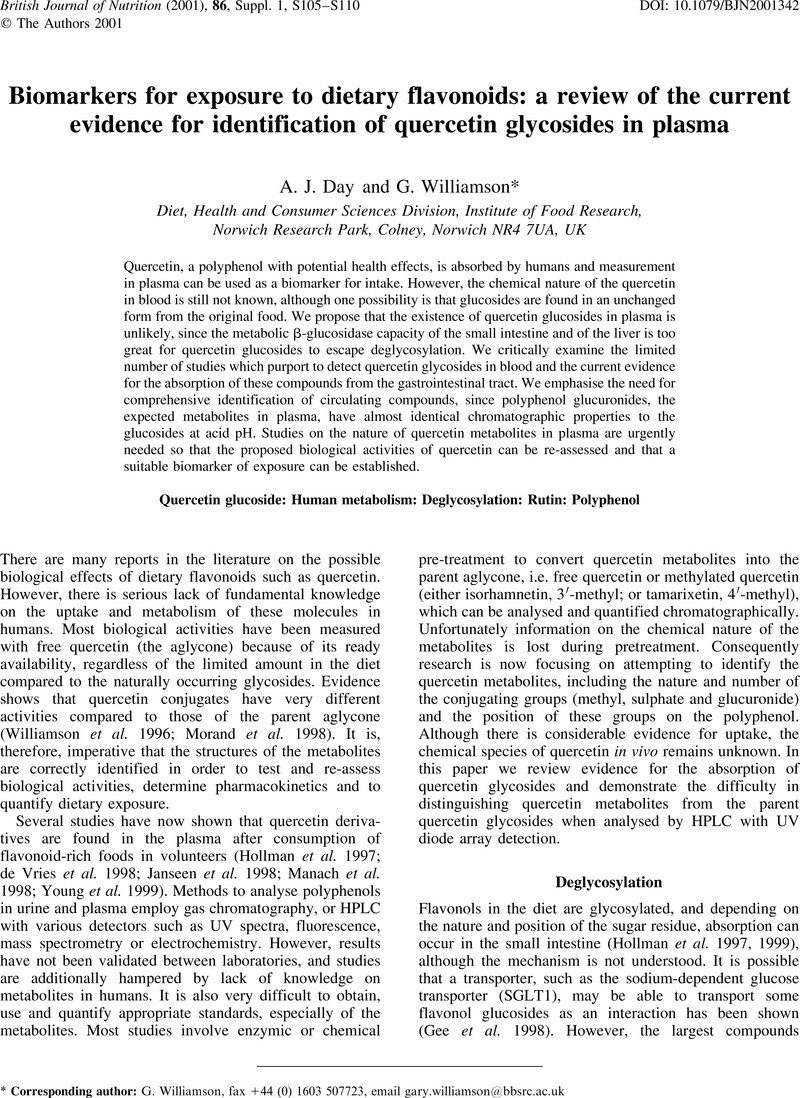Crossref Citations
This article has been cited by the following publications. This list is generated based on data provided by Crossref.
Crews, H.
Alink, G.
Andersen, R.
Braesco, V.
Holst, B.
Maiani, G.
Ovesen, L.
Scotter, M.
Solfrizzo, M.
van den Berg, R.
Verhagen, H.
and
Williamson, G.
2001.
A critical assessment of some biomarker approaches linked with dietary intake.
British Journal of Nutrition,
Vol. 86,
Issue. S1,
p.
S5.
Saponara, Simona
Sgaragli, Giampietro
and
Fusi, Fabio
2002.
Quercetin as a novel activator of L‐type Ca2+channels in rat tail artery smooth muscle cells.
British Journal of Pharmacology,
Vol. 135,
Issue. 7,
p.
1819.
Atul Bhattaram, Venkatesh
Graefe, Ulrike
Kohlert, Claudia
Veit, Markus
and
Derendorf, Hartmut
2002.
Pharmacokinetics and Bioavailability of Herbal Medicinal Products.
Phytomedicine,
Vol. 9,
Issue. ,
p.
1.
Gee, Jennifer M.
Hara, Hiroshi
and
Johnson, Ian T.
2002.
Suppression of Intestinal Crypt Cell Proliferation and Aberrant Crypt Foci by Dietary Quercetin in Rats.
Nutrition and Cancer,
Vol. 43,
Issue. 2,
p.
193.
Sesink, Aloys L.A.
Arts, Ilja C.W.
Faassen-Peters, Maria
and
Hollman, Peter C.H.
2003.
Intestinal Uptake of Quercetin-3-Glucoside in Rats Involves Hydrolysis by Lactase Phlorizin Hydrolase.
The Journal of Nutrition,
Vol. 133,
Issue. 3,
p.
773.
Goldberg, David M.
Yan, Joseph
and
Soleas, George J.
2003.
Absorption of three wine-related polyphenols in three different matrices by healthy subjects.
Clinical Biochemistry,
Vol. 36,
Issue. 1,
p.
79.
Mullen, William
Hartley, Richard C
and
Crozier, Alan
2003.
Detection and identification of 14C-labelled flavonol metabolites by high-performance liquid chromatography–radiocounting and tandem mass spectrometry.
Journal of Chromatography A,
Vol. 1007,
Issue. 1-2,
p.
21.
FU, H. Y.
2004.
Free Radical Scavenging and Leukemia Cell Growth Inhibitory Properties of Onion Powders Treated by Different Heating Processes.
Journal of Food Science,
Vol. 69,
Issue. 1,
Kay, Colin D.
Mazza, G.
Holub, Bruce J.
and
Wang, Jian
2004.
Anthocyanin metabolites in human urine and serum.
British Journal of Nutrition,
Vol. 91,
Issue. 6,
p.
933.
Kroon, Paul A
Clifford, Michael N
Crozier, Alan
Day, Andrea J
Donovan, Jennifer L
Manach, Claudine
and
Williamson, Gary
2004.
How should we assess the effects of exposure to dietary polyphenols in vitro?.
The American Journal of Clinical Nutrition,
Vol. 80,
Issue. 1,
p.
15.
Morgan
Rothwell, Joseph
and
Day, Andrea
2004.
Phytochemicals in Health and Disease.
Vol. 20045272,
Issue. ,
p.
57.
Rasmussen, S.E.
2004.
Functional Foods, Cardiovascular Disease and Diabetes.
p.
157.
Cuyckens, Filip
and
Claeys, Magda
2004.
Mass spectrometry in the structural analysis of flavonoids.
Journal of Mass Spectrometry,
Vol. 39,
Issue. 1,
p.
1.
Arts, Ilja C. W.
Sesink, Aloys L. A.
Faassen-Peters, Maria
and
Hollman, Peter C. H.
2004.
The type of sugar moiety is a major determinant of the small intestinal uptake and subsequent biliary excretion of dietary quercetin glycosides.
British Journal of Nutrition,
Vol. 91,
Issue. 6,
p.
841.
MULLEN, W
BOITIER, A
STEWART, A
and
CROZIER, A
2004.
Flavonoid metabolites in human plasma and urine after the consumption of red onions: analysis by liquid chromatography with photodiode array and full scan tandem mass spectrometric detection.
Journal of Chromatography A,
Vol. 1058,
Issue. 1-2,
p.
163.
Spencer, Jeremy
2005.
Nutrition and Cancer Prevention.
Vol. 20052271,
Issue. ,
Cassidy, A.
2005.
Encyclopedia of Human Nutrition.
p.
490.
Enkhmaa, Byambaa
Shiwaku, Kuninori
Katsube, Takuya
Kitajima, Keiko
Anuurad, Erdembileg
Yamasaki, Masayuki
and
Yamane, Yosuke
2005.
Mulberry (Morus alba L.) Leaves and Their Major Flavonol Quercetin 3-(6-Malonylglucoside) Attenuate Atherosclerotic Lesion Development in LDL Receptor-Deficient Mice.
The Journal of Nutrition,
Vol. 135,
Issue. 4,
p.
729.
Williamson, Gary
and
Manach, Claudine
2005.
Bioavailability and bioefficacy of polyphenols in humans. II. Review of 93 intervention studies.
The American Journal of Clinical Nutrition,
Vol. 81,
Issue. 1,
p.
243S.
Davis, Barry D.
Needs, Paul W.
Kroon, Paul A.
and
Brodbelt, Jennifer S.
2006.
Identification of isomeric flavonoid glucuronides in urine and plasma by metal complexation and LC‐ESI‐MS/MS.
Journal of Mass Spectrometry,
Vol. 41,
Issue. 7,
p.
911.



